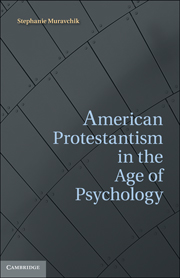Book contents
- Frontmatter
- Contents
- Acknowledgments
- Abbreviations
- 1 The Fall and Rise of Psychoreligious Cooperation
- PART ONE THERAPY AS MINISTRY IN CLINICAL PASTORAL EDUCATION
- 2 The Priest Must Drink at the Scientific Well
- 3 Being the Love of God
- PART TWO THERAPY AS FELLOWSHIP IN ALCOHOLICS ANONYMOUS
- PART THREE THERAPY AS EVANGELISM IN THE SALVATION ARMY
- Bibliography
- Index
2 - The Priest Must Drink at the Scientific Well
from PART ONE - THERAPY AS MINISTRY IN CLINICAL PASTORAL EDUCATION
Published online by Cambridge University Press: 05 July 2011
- Frontmatter
- Contents
- Acknowledgments
- Abbreviations
- 1 The Fall and Rise of Psychoreligious Cooperation
- PART ONE THERAPY AS MINISTRY IN CLINICAL PASTORAL EDUCATION
- 2 The Priest Must Drink at the Scientific Well
- 3 Being the Love of God
- PART TWO THERAPY AS FELLOWSHIP IN ALCOHOLICS ANONYMOUS
- PART THREE THERAPY AS EVANGELISM IN THE SALVATION ARMY
- Bibliography
- Index
Summary
The Great Depression found Reverend Stephen T. Wood ministering to the inmates of an Illinois prison. Opening the hearts of convicts could not have been easy. So Wood searched for ways to equip himself better for the task. He had even begun studying under Chaplain Joseph Armstrong at a nearby psychiatric hospital. He hoped thereby to hone his ability to understand and aid difficult people. Armstrong welcomed students. He was so eager for them that he had recently helped start an organization – the Council for the Clinical Training (CCT) of Theological Students – which aimed to give ministers practice in dealing with the disturbed by employing them in psychiatric facilities.
Another council founder, Reverend Arnold Dunshee, visited Wood at the prison in 1939. He was one of the nation's few fulltime, professional chaplains. He asked Wood about work with the inmates, probably because prison administrators had asked Dunshee whether they should hire Wood himself as a full-time, professional chaplain. The prison evangelist enthusiastically explained to Dunshee that he invited convicts into his office, where he could pray with them privately and talk to them about faith and the Bible. Wood's whole mission, he averred, was to “bring men to Christ.”
Based on this exchange, Dunshee declared the man utterly unfit to be a chaplain anywhere.
- Type
- Chapter
- Information
- American Protestantism in the Age of Psychology , pp. 28 - 59Publisher: Cambridge University PressPrint publication year: 2011



